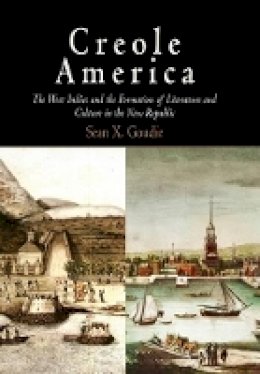
Creole America: The West Indies and the Formation of Literature and Culture in the New Republic
Sean X. Goudie
Innovative in its scope and conceptual frameworks, Creole America reveals how literary culture in the New Republic period is formed not only by expansionist designs on the North American continent but also by a push for commercial empire in the hemisphere via the roots and routes of the West Indian trades.
As Washington's Secretary of the Treasury, the chief architect of the United States as an "empire for commerce," West Indian immigrant Alexander Hamilton came to embody the great uneasiness that many Americans expressed about the unpredictable, and potentially disastrous, effects on the nation and national character of extensive relations between the slave colonies of the West Indies and the putatively free and democratic states of the independent mainland. Sean X. Goudie examines such anxiety and ambivalence as characteristic of what he provocatively terms the New Republic's "creole complex."
Across an impressive array of genres and texts—state papers, empire tracts and political pamphlets, natural histories, autobiographies, lyric poetry, drama, and prose fiction—Goudie demonstrates how distinctions between U.S. and West Indian bodies and commodities blur amid ongoing U.S. participation in the treacherous West Indian trades. Creole America thus compels readers to come face-to-face with disturbing affiliations between U.S. and West Indian creole characters and cultures at the turn of the nineteenth century.
Product Details
About Sean X. Goudie
Reviews for Creole America: The West Indies and the Formation of Literature and Culture in the New Republic
Amy Kaplan, author of The Anarchy of Empire in the Making of U.S. Culture
"This startling book brings more fully to light the hold that the West Indies had on the American imagination in the era of the new republic and, as such, moves away from an idea of American exceptionalism to one of conflicted, trans-Caribbean notions of identity that affect the production of texts in a variety of genres: nonfiction prose, novel, poetry, and drama. . . . Refreshingly new and provocative."
Jeffrey H. Richards, author of Drama, Theatre, and Identity in the American New Republic
"Goudie opens new doors in his compelling treatment of transnational and transcultural conflict. Based on extensive archival research, and including both historical and analytical frames of reference, this book studies the emergence of an enduring creole complex in America and the Caribbean in the years following the Revolutionary War."
MLA award citation
